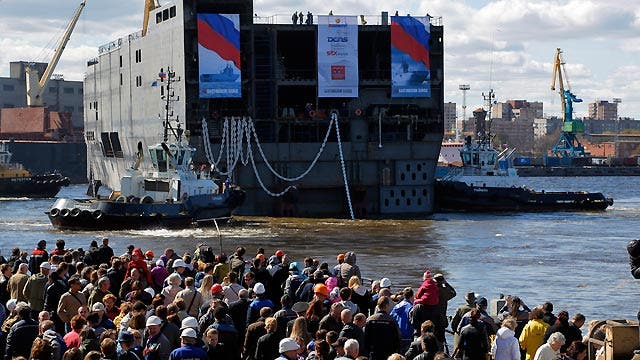France betrays US trust for Russian payoff?
Despite broader efforts by US to isolate Russia over Ukraine aggression, France reportedly plans to go through with $1.6 billion deal to build warships
The French government is facing pressure from the U.S. over the sale of two warships to the Russian navy, amid reports that Paris plans to push ahead with the controversial deal.
Despite broader efforts by the U.S. and Europe to isolate Moscow over the intervention and unrest in Ukraine, French President Francois Hollande said he plans to go through with a $1.6 billion deal to build warships for Russia, NPR reported.
French Foreign Minister Laurent Fabius was scheduled Tuesday morning for a meeting with Secretary of State John Kerry in Washington. He could face pressure from the State Department and others trying to tighten sanctions on Russia.
Pentagon spokesman Col. Steven Warren said the U.S. is addressing this with the French government.
"We have expressed our concerns to the French government over this sale, and we will continue to do so," he said, adding that Kerry and Fabius would "discuss the full range of issues regarding Ukraine."
Ironically, one of the Mistral-class warships the French are looking to build for the Russians would be named "The Sevastopol," after the Crimean port. Russia annexed Crimea in March in a move decried as illegitimate by the international community.
The Hollande government already is facing criticism at home over the proposed deal.
According to NPR, parliament member Bruno Le Maire said Hollande "absolutely" should suspend the contract, which was struck three years ago.
"It's the only way to show Vladimir Putin we're serious," he said.
But according to Russian media, Moscow said back in March -- when the French government was weighing whether to go forward with the contract -- that France should return the money if it does not deliver the ships. The ships reportedly would be deployed as part of Russia's Pacific Fleet.
Amid the contract dispute, Russian officials continue to face growing sanctions.
The European Union expanded sanctions on Monday to include several more Russian and separatist Ukrainian leaders. The move came after separatists in eastern Ukraine held a referendum calling for self-rule, which the United States and its allies again described as illegitimate.
The White House threatened increased sanctions on Russia if it tries to "disrupt" elections scheduled for May 25 in Ukraine.





